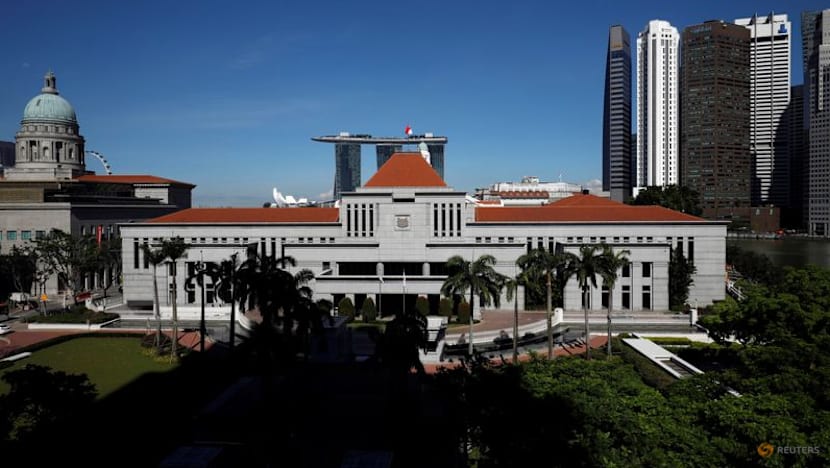Revolution for kindness? MPs suggest support for Singapore’s youth on day 3 of President’s Address debate
The 18 Members of Parliament who spoke on the third day of the debate also suggested empathy be taught in schools against the backdrop of an AI-driven future, and made suggestions to further protect youths from the harms of social media.

A view of Parliament House in Singapore on May 24, 2018. (File photo: Reuters/Edgar Su)

This audio is generated by an AI tool.
SINGAPORE: Members of Parliament raised suggestions targeted at Singapore’s youth during the third day of the debate on the President’s Address, including providing support for young parents and teaching empathy in schools.
A total of 18 MPs, including Prime Minister Lawrence Wong and four other political office holders, spoke in the course of more than six hours of debate on Wednesday (Sep 24).
In his address on Sep 5, President Tharman Shanmugaratnam highlighted the need for a "we first" mindset amid global uncertainty, which the prime minister also referenced in his speech during the debate on Wednesday.
Mr Wong pledged to build a country with youth and future generations in mind. The government aims to keep social mobility alive, strengthen safety nets and deepen a sense of solidarity, he said, noting that Singapore is facing stronger headwinds.
At the opening of the 15th Parliament earlier in September, Mr Tharman similarly called for continued investment in children, stronger career pathways for workers and greater support for lower-income families.
“This is the promise of Singapore: that birth does not dictate destiny, that no one is left behind and that every generation can look ahead with optimism and hope,” Mr Tharman said at the time.
Trust built through years of collaboration between the government, employers and unions would help Singapore adopt new technologies like artificial intelligence (AI) while mitigating disruptions to the workforce, he added.
CALLS FOR MORE KINDNESS
On Wednesday, MP Charlene Chen (PAP-Tampines) said that as Singapore adopts new technology, including AI, individuals must closely guard their “human strengths” – judgment, intuition and compassion.
Setting rules or guidelines cannot be the only response to technology, she said, stressing the importance of shaping mindsets.
The “we first” mindset raised by Mr Tharman should start with kindness, said Assistant Professor Chen.
“Kindness may sound simple, but it is the foundation of empathy, resilience and perspective-taking. The very soft skills our young will need to survive the AI era.”
Students should be taught empathy in school, alongside knowledge and skills that will help them manage stress and emotions, she suggested.
Experiential learning through, for example, community service projects and outdoor challenges, will let them experience responsibility and interdependence, said Asst Prof Chen.
“These approaches should be built systematically into our school curriculum at every level, so that empathy and emotional resilience are not left to chance,” she said.
Make kindness second nature to nurture a "we first" mindset, said MP Charlene Chen. Kindness must be lived in every sphere of life - at home, in school, in the community and workplace, and into digital spaces, she said. Speaking in parliament on Wednesday (Sep 24), she stressed that the role of the government is to enable kindness by making it easier to care, and the true test of progress is “not how high we climb but how many we bring along with us”.
Minister of State for Education and Digital Development and Information Jasmin Lau (PAP-Ang Mo Kio), meanwhile, called for making kindness the norm.
This is the best way to “defeat” bullying, said Ms Lau, adding that she takes her role in the Ministry of Education’s (MOE) review of anti-bullying efforts very seriously.
“The real revolution is not against bullying, but for kindness. Let us not just tell our children to be kind to one another. Let us, as adults, be kind and respectful to each other, so that our children in Singapore watch, learn and mimic the kindest generations,” she added.
USE OF TECHNOLOGY
As Singapore embraces technology and prepares its youth for an AI-driven future, people must remember to never lose their humanity, said Ms Lau.
No algorithm can replace “deeply human capacities” like empathy, kindness and moral judgment, she added.
“So as we advance, let us hold firmly to the values that make us human. Because it is these values that will guide how we use technology and ensure it serves people, and not the other way around,” she said.
Minister of State for Defence and National Trade Union Congress deputy secretary-general Desmond Choo said the government must consider expanding the SkillsFuture Mid-Career Training Allowance scheme to younger workers.
The Career Conversion Programmes must also be broadened and expanded to equip young workers with AI and sustainability-related models, he added.
Preparing youths for a world where AI is transforming the workplace demands more than enhancing the curriculum or revising the Primary School Leaving Examination scoring system, said Workers’ Party (WP) Non-Constituency MP (NCMP) Eileen Chong.
“It demands an educational environment that celebrates different forms of intelligence, (has) many definitions of success and which values collaboration alongside competition,” she added.
Cultivating “uniquely human traits and values” that enable meaningful work where machines have limitations is also important, said Ms Chong, stressing the importance of soft skills.
MP Rachel Ong (PAP-Tanjong Pagar) proposed that social media access for children be delayed until they are at least 16 years old, highlighting that excessive social media use and cyberbullying can lead to extremely severe depression, anxiety and stress in youths.
“Social media today is not just a distraction; it has become a powerful force shaping identity, relationships and the mental and physical well-being of our young. (It) influences how they see themselves, and how they connect with others and how they measure their own worth,” she added.
Robust age verification, strict time limits and phone-free zones will be needed to delay children’s access to social media until they turn 16, she said.
To navigate the unknown together as one inclusive society, Singapore must focus on the well-being of its people, said MP Nadia Ahmad Samdin. Speaking in parliament on Wednesday (Sep 24), she stressed the need to improve mental health. This means making every school a place of nurture and safety, every workplace a circle of purpose and care, every home a source of strength and love, and every neighbourhood a compassionate community. She said Singapore “must protect the hearts and minds of our people”, adding that "as our only natural resource, a healthy population is key to the country's long-term stability and prosperity".
MP Nadia Ahmad Samdin (PAP-Ang Mo Kio) similarly addressed the dangers of increased digital exposure. Children are subject to the “mercy of algorithms” designed to sustain their attention with sensational or emotional posts, she said.
Social media forces children to grow up too fast, she added, having seen primary school students dancing to “mildly risque dance moves” from Netflix’s KPop Demon Hunters.
“Coupled with deepfakes and false content, this results in a disorientation of body image and (a) disjoint in their perception between what is portrayed online and the real world,” she said.
Ms Nadia proposed that children’s mental health screening will also be part of the health plans under the Grow Well SG programme, and that services by the Youth Community Outreach Team can be expanded to include children under 12 years old.
SUPPORT FOR YOUNG PARENTS
Singapore is becoming a super-aged society where many people will find themselves in the “sandwich generation”, caring for their parents while raising children and managing their own careers.
More should be done to support caregivers, said Ms Chong, noting that subsidies for infant care and childcare are tied to a mother’s employment status.
For example, higher subsidies are available to families where mothers work at least 56 hours a month, she added.
“This creates a troubling message that paid work is inherently more valuable than unpaid care work,” she said.
Ms Chong called for equal preschool subsidies for all children regardless of their mothers’ employment circumstances.
“Every child deserves the best start in life and every family deserves support in accessing it, whether the mother works in an office or runs a household while providing care for other family members,” she added, suggesting that paid caregiving leave would be “another meaningful step forward”.
Having families is not just a private choice because they are a public good, shaping the strength of the workforce, the resilience of national defence, the cohesion of communities and the depth of national identity. MP Cassandra Lee said this in parliament on Wednesday (Sep 24), noting that a "we first" Singapore society called for by the President and Prime Minister cannot endure without recognising who “we” are - and that families give meaning to “we”. She called for more steps to bridge the gap that working parents face in juggling jobs and childcare; to equip parents with raising children in a digital world; and to connect with seniors, more of whom are living alone. These suggestions will come at a cost, she said, and Singapore must decide whether the cost is worth it.
MP Cassandra Lee (PAP-West Coast-Jurong West) also raised suggestions to help young parents who juggle building their careers and caregiving responsibilities.
Singaporeans have “consistently” said that their careers and raising a family are equally important to them, she added, urging the government not to make them choose between the two.
Acknowledging that the suggestions cost money and may exacerbate manpower challenges, she called for mindset shifts from employers and employees to make them work in a “mutually beneficial” way.
Ms Lee proposed that childcare leave be restructured to increase incrementally with each child, and flexible work arrangements be made “genuinely accessible” to both mothers and fathers.
Contingencies for common childhood illnesses can be provided where the children are, she added.
She also proposed bringing active ageing centres and schools together to empower seniors to “find their second lease of life” and ease the load on parents.
For example, youths could teach digital skills to seniors, or take part in intergenerational sports like pickleball.
INCLUSIVE SOCIETY
MP Foo Cexiang (PAP-Tanjong Pagar) said public spaces must be the “heart” of Singapore’s communities, where people come together to partake in common interests and embrace their differences.
“We don’t have to be limited to conventional spaces such as the community centres or the basketball courts,” he said, calling for ground-up proposals for projects in state buildings or on state land that aim to strengthen Singapore’s multicultural community.
To foster multiculturalism, individuals need to put in “much more effort” to understand each other’s differences, he said.
“The more we are inundated with views similar to our own, the more we must seek out alternative, even opposing viewpoints.”
He raised the question of whether the ethnic integration policy could be more effective if priority were given to applicants of different ethnic backgrounds who pair up and apply to be neighbours together.
“Now I know this will require further study, but my larger point really is that it cannot just be the numbers that we seek. It must be the quality of the relationships forged that we aspire towards,” he added.
WP’s Jamus Lim (WP-Sengkang) suggested changes to the way mainstream schools are resourced and reiterated his call to make private transportation more affordable for those who need it – the elderly, those with many children and those with disabilities.
Currently, schools receive resources proportional to their needs, he said. For example, a school that has additional programmes like electives will receive more than the baseline funding.
This approach fails to account for how students in different schools have access to different amounts of resources, said Associate Professor Lim.
Instead, the government should “disproportionately” support weaker schools, or ensure that the best teaching graduates spend “significant time” in such schools, tying their career advancement to how much those schools have improved.
The Sengkang MP revisited his party’s proposal for a needs-based COE system, stressing that the current system does not ensure that those who own private cars are also those who need them the most.
“Accepting the COE system effectively acquiesces to an unequal outcome: that those who have more resources are able to buy more cars,” he added.
“Yet we already recognise that some groups, the elderly, those with many children, the disabled, do have greater needs that are deserving of more support from society.”
These groups already “explicitly” receive support through other government policies, and a fairer system would make private transportation more affordable for them, he said.



















